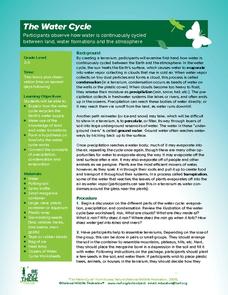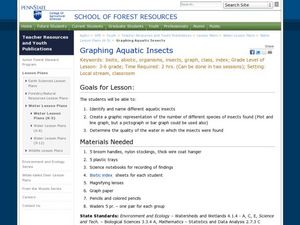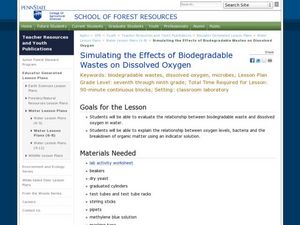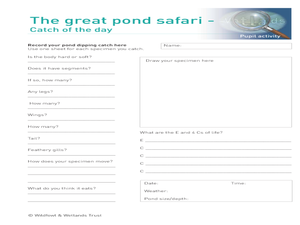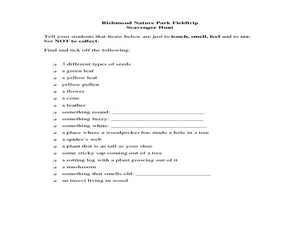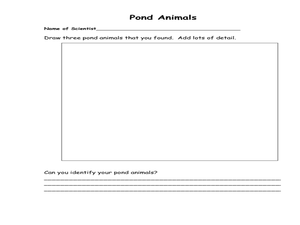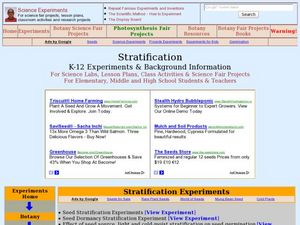Curated OER
The Water Cycle
Students are introduced to the components and importance of the water cycle. They are shown how groundwater moves using a model. Students list 9 places on earth where water is found. They define the terms cycle and water cycle.
Curated OER
Graphing Aquatic Insects
Students identify aquatic insects. In this organism lesson, students locate aquatic insects near a local waterway and collect them. Students graph the amount of insects that they collected.
Curated OER
Simulating the Effects of Biodegradable Wastes on Dissolved Oxygen
Students evaluate the relationship between biodegradable waste and dissolved oxygen in water. In this biodegradable wastes lesson students complete a lab activity in groups then analyze their results.
Curated OER
Earth Water Distribution and Water Consumption
Young scholars explore the need for conserving fresh water and understand that it is a limited supply. In this water consumption lesson plan students participate in an activity and answer questions.
Curated OER
Acid Rain: Where Have All the Rainbows Gone?
Students study the pH scale and sources of acid precipitation. In this acid rain lesson students complete a lab on acid rain then complete a handout.
Curated OER
Floods
Students investigate how hurricanes impact a stream flow. In this floods lesson plan students predict the impact of storms on animals and interpret data.
Curated OER
Develop a Bird Feeder Watch List
Students explore biology by identifying animals on their school ground. In this bird species lesson, students create and utilize a simple bird feeder to attract birds near their classroom at which point they observe the color, size and...
Curated OER
Pond Safari
Students investigate organisms and animals by examining a nearby pond. In this ecosystem instructional activity, students participate in a field trip to a local pond where they utilize a net to gather animals, plants and pollution items,...
Curated OER
Richmond Nature Park Field Trip
Students identify different plants and their uses by attending a field trip. For this Canadian plant lesson, students explore the great outdoors of Vancouver, B.C. and discuss the uses of plants by the Native Americans that once resided...
Curated OER
Pond and Pond Organisms
Students explore pond ecosystems. In this pond organism activity, students will use pond water and a plastic bad in order to locate and identify freshwater organisms. The activity is designed for younger grades, but includes an...
Curated OER
Mighty Macroinvertebrates
Seventh graders identify the names and features of macroinvertebrates found in Turtle River. In this ecology lesson students use digital microscopes and take pictures of invertebrates.
Curated OER
Stratification
Students study the process of stratification and seed dormancy. In this germination lesson students prepare a medium in which to grow seeds.
Curated OER
Our World A Complex Eco-system
Sixth graders set up an ecosystem, investigate conservation techniques, develop an action plan for conservation, and various other activities to explore the ecosystem.
Curated OER
Coastal Development
Students examine how a coastal area changes after it has been developed. They discover the impact of development on the environment. They illustrate their own non-developed area and change it into a developed area.
Curated OER
Junior Engineering Surface Water
Students experience the effects of pollution and erosion on a model of a watershed and explore ways to change the outcome.
Curated OER
Cleansing, Sparkling Koos
Students explore the importance of water conservation and investigate how plants clean water.
Curated OER
Ecosystem Soil Study
Sixth graders take soil samples and analyze the samples and ecosystems found within them.
Curated OER
Meadow Study
Young scholars examine insects they collect in a sweep nets. They identify as many of the insects as they can.
Curated OER
The Arctic and Taiga Ecozone of Canada
Learners discover the differences in the Arctic and Taiga regions of Canada. They identify physical and human characteristics of both region. They also practice using an atlas.
Curated OER
What is an Estuary?
Students define the terms estuary and watershed. They conduct an experiment to determine the density differences between fresh and saltwater. They examine the salinity distribution of the Peconic Bay Estuary.
Curated OER
Water Table
Students study the meaning of a water table and how it contributes to the existence of streams, swamps, and lakes in Nebraska. They conduct an experiment and complete a diagram of the hydrologic cycle.
Curated OER
Understanding Estuaries
Young scholars work together to develop their own estuarine ecosystem in an aquarium. They observe the aquarium daily and record them in a notebook. They discuss the different interactions they see with the class.
Curated OER
Investigating Animals in Water
Students observe small animal activity. They identify local water animals and describe the habitats where water animals can be found. Students collect samples to observe in the classroom.
Curated OER
Seeing a World of Difference
Students read through the lyrics and listen to a song about biodiversity. Using pictures they draw, they interpret the song according to their prior knowledge. They identify the threats to different regions around the world and create...
Other popular searches
- Louisiana Wetlands
- Animal Adaptations +Wetlands
- Animal Adaptations Wetlands
- Freshwater Wetlands
- Animals of the Wetlands
- Wetlands Water Cycle Diagram
- Watersheds and Wetlands
- Inland Wetlands
- Project Wetlands
- Wetland Soil Classification
- Wetlands Habitat
- Abc Book on Wetlands


